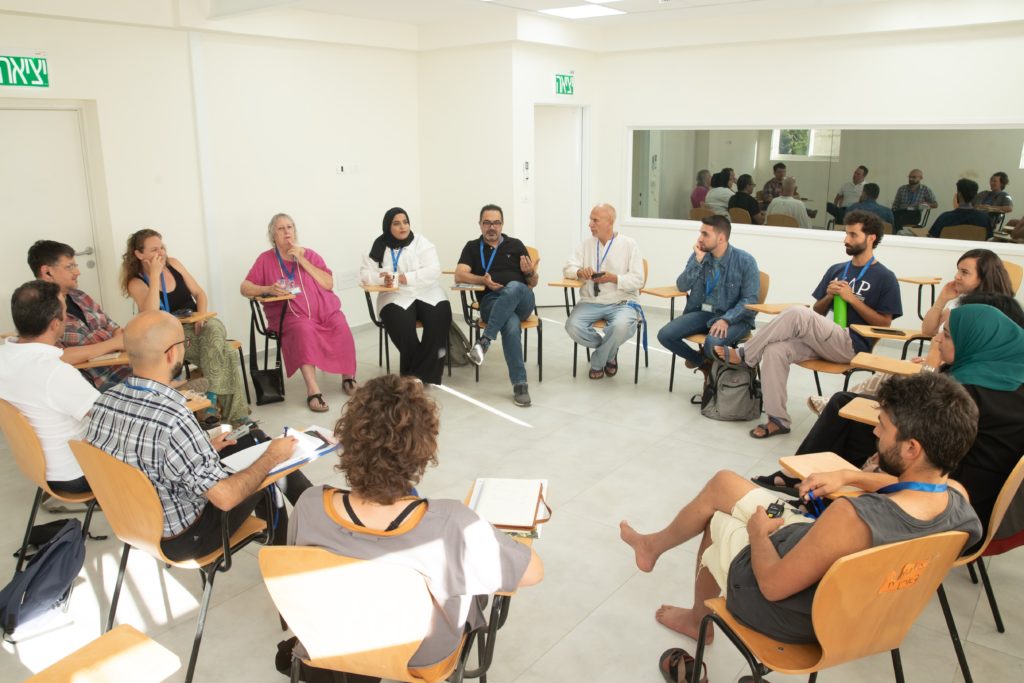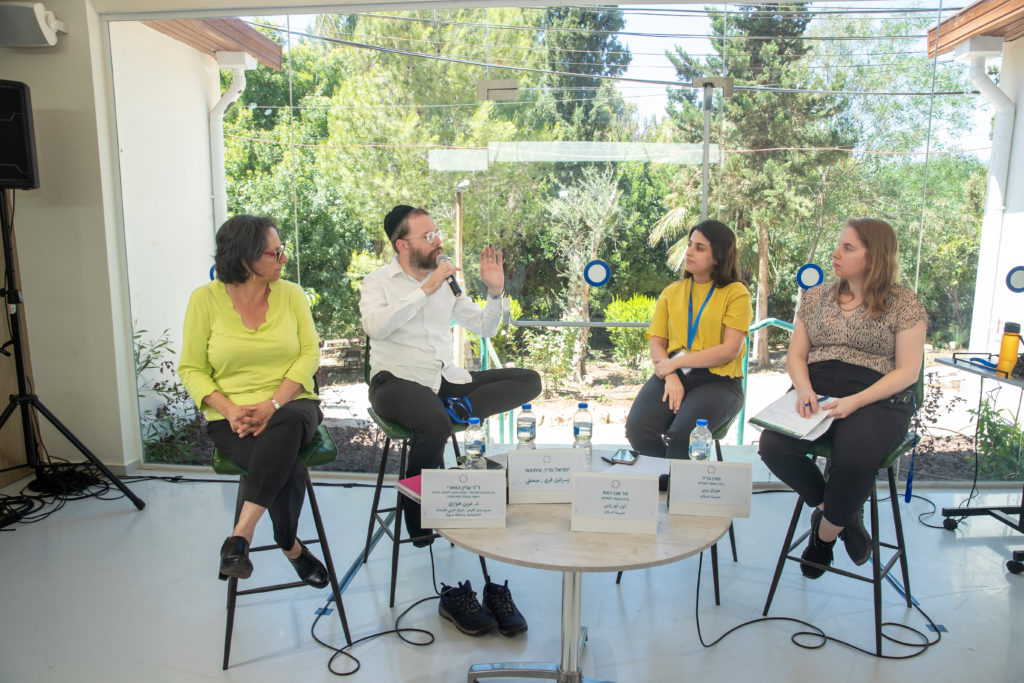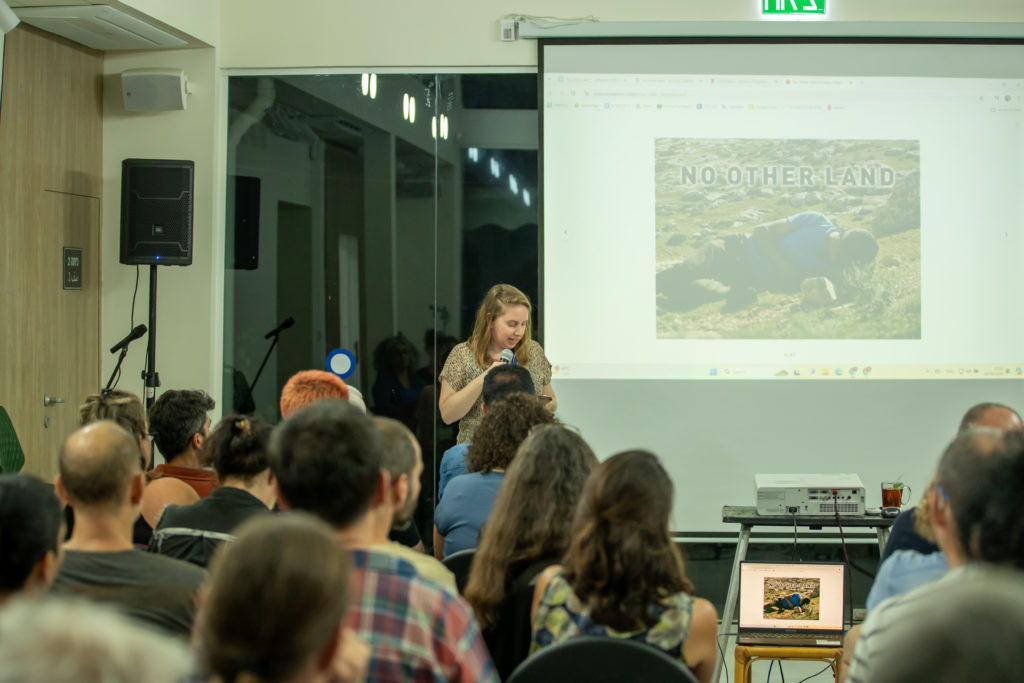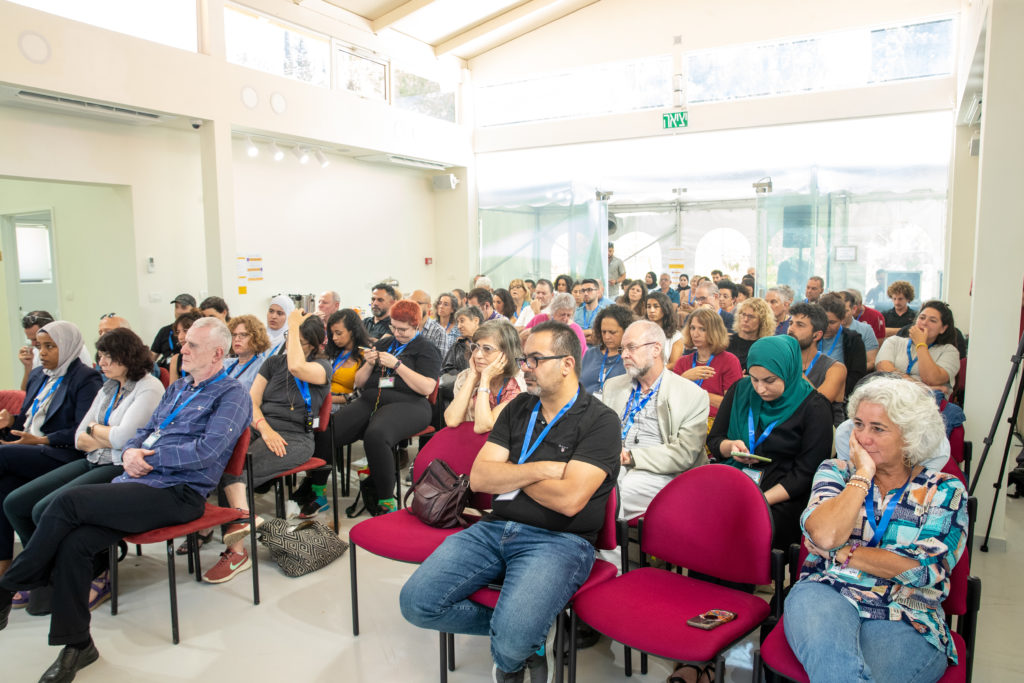
On Friday and Saturday, May 31-June 1, 2024, the 3rd annual alumni conference of the School for Peace was held.
Approximately 80 alumni attended, and the public events drew over 100 participants.
The conference focused on the topic of liberation, through binational and national dialogue, alongside knowledge sessions such as expert panels and a documentary screening.
Purpose of the Conference
The primary aim of the alumni conferences is to provide a space for alumni from all courses, years, and fields to meet, connect both personally and professionally, exchange knowledge, learn together, deepen their analysis of reality, and recharge to continue their work as agents of change in the field.
The Question of Holding the Conference
This year’s conference occurred against the backdrop of a devastating war and an extreme period marked by high levels of violence, polarization, intense emotions, and significant impacts on everyone. The traumas from recent events, including massacres, annihilation, displacement, starvation, and unimaginable destruction, threaten to paralyze us all.
There was significant debate on whether it was appropriate to hold the conference under these conditions. Committed to supporting our alumni and exploring ways to maintain healthy relations between Palestinians and Jews amidst the ongoing political conflict, and striving for an end to the war, justice, equality, peace, and partnership, we decided to proceed with the conference.
A central question was whether dialogue is legitimate during such a brutal and bloody war. Some argue that in the face of severe oppression, all actions must directly oppose it, and dialogue might normalize the situation. However, we believe dialogue complements action, sharpens values and goals, and ideally leads to action. It helps understand ourselves and reality better and serves as a tool to overcome paralysis and anxiety induced by the war.
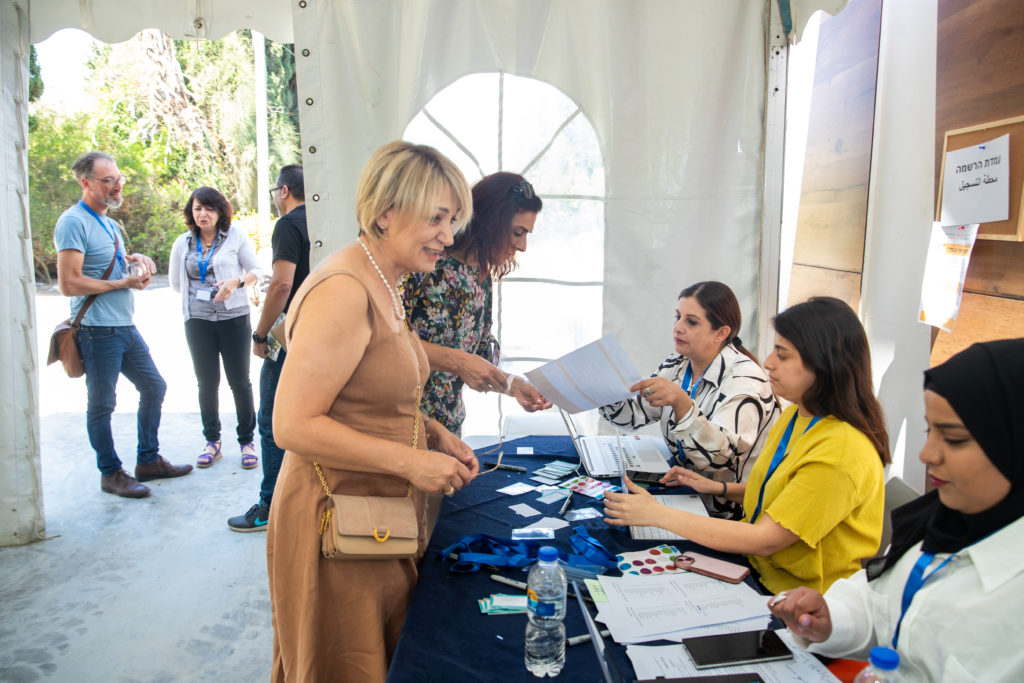
Conference Theme
This year, the chosen theme for the conference was liberation. We sought a topic that would address the catastrophic events of the time and allow us to look towards the future, paving a path from the harsh reality to a better one. We wanted to use dialogue to advance the discourse and insights that could impact actions for change. The goal was to initiate a conversation about liberation, which currently doesn’t exist between Jews and Palestinians, and to learn together how to promote liberation.
Conference Structure
The conference included several elements: dialogue in fixed groups over two days (three sessions in a binational forum and two in a national forum), a central panel with Areen Hawari and Israel Frey moderated by Moran Barir and Noor Abu Ras from the School for Peace team (open to the public), screening of the documentary “No Other Land” by the Masafer Yatta collective (winner of the Best Documentary at the Berlin International Film Festival), a panel presenting five alumni projects supported by the School for Peace, and a photography exhibition by alumni of the Environmental Justice course.
Here is the link to the conference program. Details about each component of the conference follow.
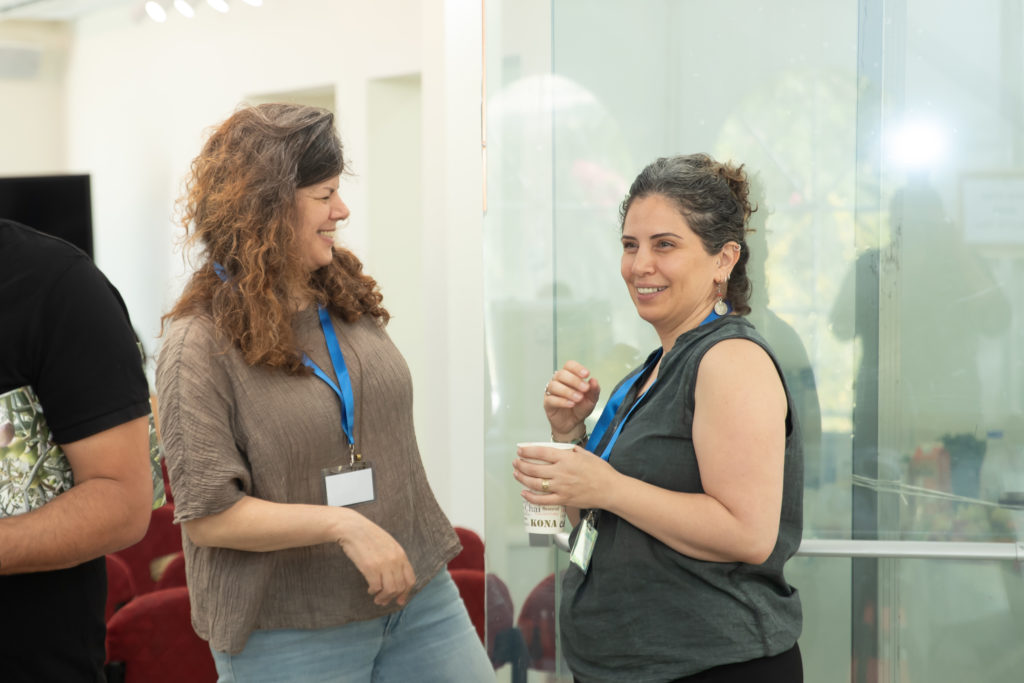
The Dialogue at the Conference
Dialogue is the central tool of the School for Peace, aimed at raising awareness of ongoing oppression and power relations between the two national groups, allowing each participant to explore their position in relation to the political reality, and encouraging action from a sense of responsibility and agency. The dialogue at the conference took place in fixed groups and included five sessions over two days. The choice of liberation as the theme opened a different conversation, moving from discussing oppression to talking about the future and liberation from oppression. Key questions discussed included the roles and responsibilities of each group in the liberation process and the day after. Many participants reported that the joint gathering strengthened them, and the opportunity to speak and deepen their thinking together allowed for the liberation of thought from oppression and the liberation of speech from silencing, as a significant step towards forming a liberation consciousness. Both the facilitators and the participants testified to a powerful and profound process that everyone went through during the dialogue at the conference.
Central Panel “Thoughts on Liberation”
As every year, to support dialogue and provide perspectives from experts and people in the field, we held a central event featuring two speakers: Dr. Areen Hawari, a feminist activist and director of Mada al-Carmel – The Arab Center for Applied Social Research, and Israel Frey, an independent journalist. The panel was moderated by two School for Peace staff members: Moran Barir and Noor Abu Ras. We chose a dynamic conversation format rather than separate lectures to foster an exploratory space on liberation, allowing for a mental process through questioning and deep reflection.
Screening of the Film “No Other Land”
On Friday evening, after a day full of activities and dialogue, we screened the documentary “No Other Land,” directed by Basel Adra, Hamdan Bilal, Yuval Abraham, and Racheli Shor. The film won the Best Documentary award at the Berlin International Film Festival this year and gained significant attention after Yuval and Basel’s acceptance speech, in which they called for an end to the war and spoke about the discriminatory and unequal system governing their lives—a system that prioritizes Jewish citizens and oppresses Palestinian citizens. This speech garnered widespread international reactions, both supportive and opposing. The film follows several years of the struggle of the villages of Masafer Yatta in the southern Hebron Hills against the ethnic cleansing and attacks they face, including frequent building demolitions, arbitrary arrests, and violent, sometimes deadly, attacks by their Israeli settler neighbors. At the same time, the film tracks the partnership formed between Yuval, a Jewish-Israeli journalist, and Basel, a resident of Yatta and a leader of the popular struggle in the area.
Presentation of Alumni Projects
The project presentations at the conference aim to meet two important objectives of the School for Peace: [1] to keep supporting our graduates after they have completed the course with us, in order to help them in their reality-changing activity, and [2] to provide a platform to showcase alumni projects and inspire other alumni to join existing projects or initiate their own. This year, we focused on recent alumni from the past year’s courses, those with a project idea or a project in its early stages, with the intention of supporting these delicate early development stages. During the conference, seven alumni projects were presented: five in the closing panel of the conference on Saturday and two at the beginning of the conference.
For further reading on the projects presented at the conference.
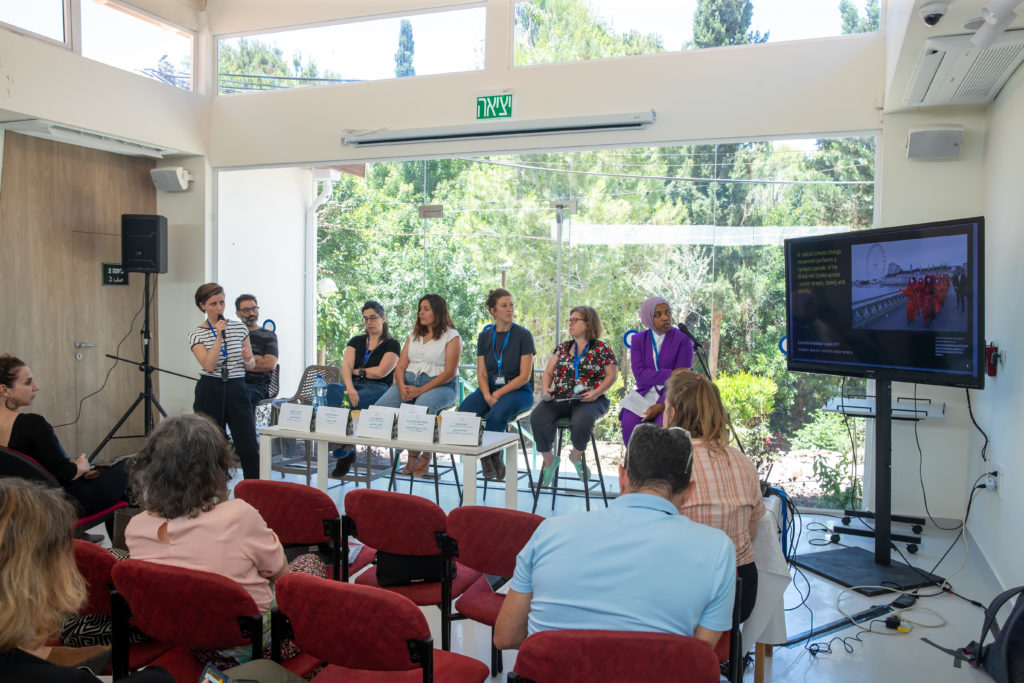
Participants’ Feedback
“The conference was excellent, very well organized, interesting, and empowering.”
“Thanks to the conference, I felt part of a community and part of a conversation that hardly takes place anywhere else.”
“I truly believe this conference was beneficial. Personally, I gained a lot, and I am now embarking on an important project that has the potential to significantly change reality.”
“It’s a unique gift, especially the encounters and the discussions.”
“We started a conversation that didn’t exist before.”
“I realized from the dialogue at the conference how much fear it evokes and how many are hesitant about liberation due to various inhibitions.”
“The young participants at the conference encouraged me. It’s good to know there is a young generation that cares.”
“During these times, the very possibility of dialogue brings some air, and the conference topic offered hope and freshness. The organization was meticulous and dedicated.”
“Through the dialogue, I understood that there’s a lot to explore and observe from each national group’s perspective on liberation, which is the flip side of oppression. It’s a concept that symbolizes hope, and there’s a lot of power in that.”
“It was really fun to meet people from past groups and feel a sense of partnership.”
“I left the conference with a sense of community power to create hope and feel belonging even when in a minority position in society.”
“My expectations were primarily for meaningful dialogue, and they were definitely met.”
“The conference connected me to activism, recharged my energy, and alleviated the sense of loneliness that accompanies daily life.”
“I am glad I managed to participate in the two days of the conference and meet new people. I came with no expectations because I feared disappointment, but I left feeling the opposite. The conference gave me a light, even if small, at the end of the tunnel, despite the significant gap that has grown between the two sides since October 7.”
__




